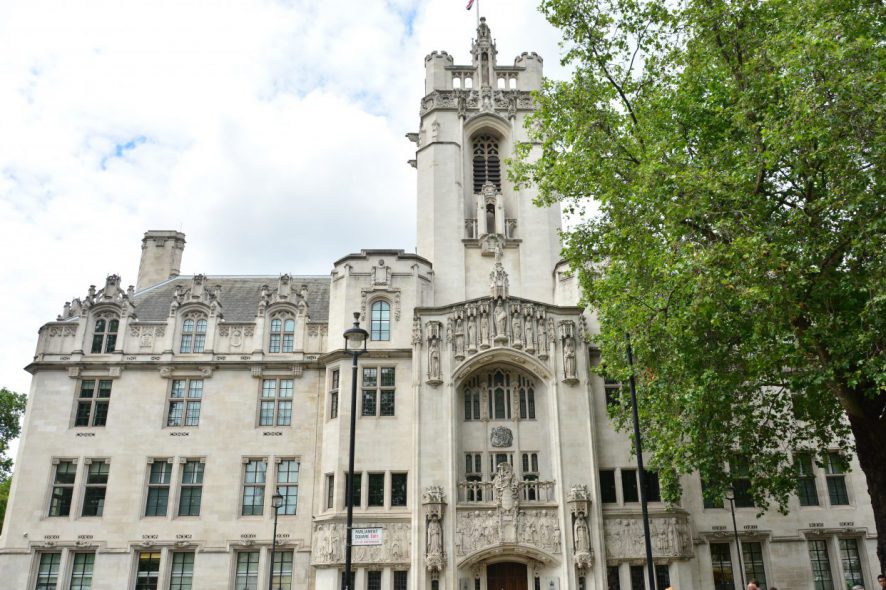Supreme Court of the United Kingdom: Full Bench of Lady Hale (President), Lord Reed (Deputy President), Lord Lloyd-Jones, Lord Sales and Lord Thomas dismissed an appeal application filed Resilient Energy Severndale Ltd. (first appellant) and Forest of Dean District Council (second appellant) against the appellate court’s order in an application filed by Mr Wright (a local resident) who challenged change of land use at a farm in Gloucestershire from agriculture to erection of a wind turbine.
Resilient Energy Severndale Ltd. is a company involved in energy production which involves a community benefit society registered under the Community Benefit Societies Act, 2014 to carry out its task of energy production. In its application for planning permission, Resilient had proposed that the wind turbine farm would be run by community benefit society and an annual donation would be made to a local community fund based on 4 per cent of society’s turnover from the operation of the turbine for a projected span of 25 years. The community benefit fund was expressly considered by the council in its granting of the application. Later, a condition was imposed by the council that the development be undertaken by a community benefit society with the community fund donation as a part of the scheme.
The respondent’s basis for challenging the grant of permission was that donation was not a material consideration and the Council acted unlawfully by taking it into account. Another subsidiary issue also challenged was that whether the Council was entitled to include a condition for development to be undertaken by community benefit society in the planning permission. Mr. Wright succeeded in the Court of the first instance and in the Court of Appeal. Aggrieved by those orders, the instant appeal was filed.
Issue: Whether the promise to provide a community fund donation qualifies as a “material consideration” for the purposes of Section 70(2) of the Town and Country Planning Act, 1990 and Section 38(6) of the Planning and Compulsory Purchase Act, 2004.
Mr Wright submitted that the grant did not serve the planning purpose; neither was it related to land use nor it had no real connection to the proposed development. The Supreme Court unanimously dismissed the appeal holding that planning permission is required for the development of land, which includes the making of any material change in use of land (under the 1990 Act). Further, the planning authority must have regard to the development plan and any other considerations material to the proposed change of use (under the1990 Act and 2004 Act).
Reliance was placed on the case of Newbury District Council v. Secretary of State for the Environment, [1981] AC 578 which laid down the three-fold test for “material considerations”. It is required that the conditions imposed must be: (i) for a planning purpose and not for any ulterior purpose; (ii) fairly and reasonably relate to the development, and (iii) must not be so unreasonable that no reasonable planning authority could have imposed them.
The Court discussed about the community benefit funds and its benefits-in-kind as mentioned in the Community Benefits from Onshore Wind Developments: Best Practice Guidance for England” (“the DECC Guidance”) which states that provision of these community benefits are entirely voluntary undertakings by wind farm developers and should be related to the needs of the local community. The DECC guidance further stated that community benefits are separate from the planning process and are not relevant material consideration for planning permission. The Bench discussed strict principle mentioned in the English Planning system that states that planning proposals should be determined based on planning issues, as defined in law and planning legislation prevents local planning authorities from specifically seeking developer contributions where they are not considered necessary to make the development acceptable in planning terms. The Bench also considered a report submitted by an officer in July 2015 which advised the Council’s planning committee that the community benefit fund was not a material consideration because there were no clear controls and/or enforcement measures that could ensure the benefit was delivered, and in any event, (ii) the fund could be used to finance projects that were unconnected to low carbon energy generation.
The Court opined that the community benefits promised by Resilient did not satisfy the Newbury criteria and therefore did not qualify as a material consideration under either the 1990 or the 2004 Act. The benefits were not proposed to pursue a proper planning purpose, but rather for the ulterior purpose of providing general benefits to the community. They did not fairly and reasonably relate to the development for which permission was sought; the community benefits did not affect the use of the land but were instead proffered as a general inducement to the Council to grant planning permission, in breach of the principle that planning permission cannot be bought or sold.
Based on the reasoning provided above, the appeal was dismissed unanimously by the bench. [R v. Resilient Severndale Ltd. and Forest of Dean District Council, [2019] 1 WLR 6562, decided on 20-11-2019]







